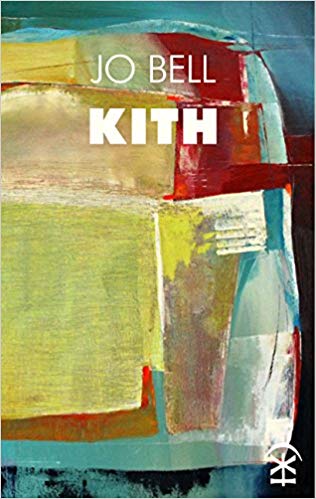REVIEW: JO BELL’S ‘KITH’
KITH BY JO BELL
NINE ARCHES PRESS
ISBN: 978-0993120107
98 pages/£9.99
Reviewed by: Stella Backhouse

In the concluding lines of the title poem of this, her second collection, Jo Bell observes to those who are her Kith: “I am not who I think I am/but who you know me to be”. The primacy of the reader is a commonplace of modern literary criticism; but in a wider society that constantly urges the rewards of being one’s ‘true self’, the idea that personal identity is created not by ourselves but by others could be viewed as challenging. But it’s typical of Bell that the possibility that even our very selves are not of our own making is made to sound not just not a problem, but actually – quite sexy.
Profoundly sexual is one of the things thatwe the readers of her poetry – assuming we are included in her kith – know Bell to be. Through this varied and joyous collection, we also encounter her as nature-lover, narrow boat skipper, appreciator of life lived slowly, traveller, people-watcher and meditator on language.
There is a sense, indeed, that when Bell speaks of her ‘kith’, she is speaking not of humans at all, but of language. It is, after all, the word and its sound that she admires: “made scant by frequent use/I like it for its urgency and spit…I like it for its oldness/for its slingshot certainty”.
This concept of language as creator and knower of our most intimate selves is introduced from the first poem, ‘Crates’: “Observe that when I speak of crates/your mind supplies one straight away…Your crate exists as soon as it is thought./Its shape is shown in speaking of it”. Elsewhere, Bell’s given name is “the root of me…the word I wear under my tongue/that font-and-deathbed tag”.
On the other hand, there is always a nagging suspicion that “cloth[ing] in a word” is the precursor to limitation. In ‘Eve naming the birds’, our universal mother sadly notes how “I name them into shame, weeping for their loss./So, the wordless world is finched and hawked.” ‘Infallible’ meanwhile, has Renaissance artist Giotto responding to the news that “the Holy Father’s business is to speak for God” with a perfect circle swiftly drawn and a terse “God speaks for himself”.
Each of us speaks our chosen language most clearly, Bell suggests, when we are in the element that suits us best – it is this, perhaps, that is our true kith. A boat in dry dock is “A welded tongue; she’s fluent wet/and dumbstruck dry”; in Lancashire, brass bands play “music turned on lathes…borrowed songs, but spoken in our tongue”. Language transcends mere words. It creates us. The names of much-loved landmarks “will pass like rain/but I am buried in them, they in me:/their soil will cling to me a little when I fall”.
And the poems themselves illustrate this transcendency: part of Bell’s alchemy is that she tells so much about language in such everyday words. Her cast of the plain and the familiar is stroked and coaxed by her into rich and exciting other lives. “I only know the ones that sound like muesli” says the urban nature-lover in ‘Birdsong at the rec’, “speckling the day with goodness”.
This idea of excavating and exploring the seemingly limited for hidden potential is mirrored perhaps in the slow, flat-capped backwaters of the canal network Bell loves: “the cut is working water. Straightened /straitened, boxed and sluiced; contained/and discontent”. In her hands, however, it also becomes metaphor for life-affirming sexual encounter: the finale of the filling of a lock is a “shudder in the gate/the backward drifting boat that tells you/there and here are equal, an imbalance/righted”.
Earthy and accessible, this multi-layered collection feels comfortable in its own skin. Its view of “the sky/an unstoppable blue” may be narrow; but it digs deep to find it.
Kith is available to buy from Nine Arches Press, Hive and other online retailers.
